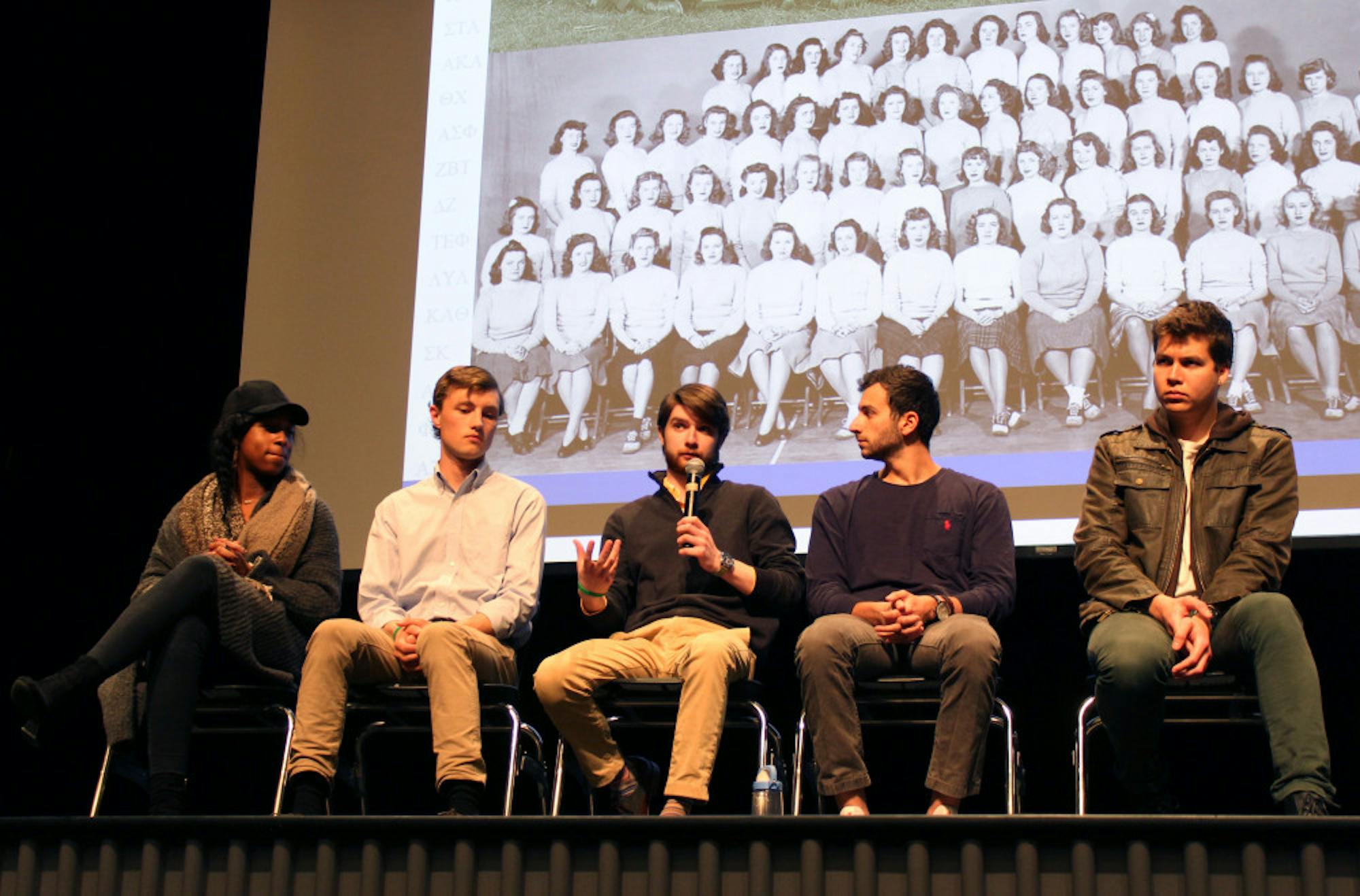Yesterday evening, the Inter-Greek Council (IGC) and its Diversity and Inclusion Task Force hosted a discussion in Cohen Auditorium entitled “Greek Life at Tufts: Where We Were, Where We’re Going” about the the history of Greek life and its current state at Tufts. The discussion focused on diversity and inclusion, shaping campus life and impact on the national Greek life scene. About 40 people were in attendance.
Charlie Trantanella (E '89), author of the book "Brown and Blue and Greek: A History of Fraternities, Sororities, and Early Student Organizations at Tufts University," gave a presentation on student culture and development, social justice and Greek life at Tufts.
Trantanella was a member of the Sigma Nu fraternity while at Tufts. He began his presentation by talking about the history of student life at Tufts since the university’s inception.
“Student life was just not something ... [the administration] cared about. Student life was left to the students,” Trantanella said.
Trantanella walked the audience through the history of Greek life at Tufts, which began with the formation of Zeta Psiand Theta Delta Chi in 1855 and 1856, respectively.
These first fraternities established Tufts' first undergraduate publications, according to Trantanella.
“The first fraternities published annual yearbooks and 'The Tuftonian' publication, which became The Tufts Weekly. They also organized sports teams, like baseball and crew,” Trantanella said.
Trantanella also described the history of sororities at Tufts, the first of which, Alpha Delta Sigma, was founded in 1895 and would eventually become Alpha Omicron Pi (AOII).
Trantanella described the sororities as having similar contributions to campus social life as fraternities, while also establishing scholarships for women to study at Tufts.
He also emphasized the history of black Greek-letter organizations at Tufts.
“Historians overlooked black Greek-letter organizations, which have a rich history at Tufts for over a century,” Trantanella said.
Black Greek-letter organizations established scholarships and attracted black students to campus in the 19th century, an era when many other colleges in the area, such as Harvard, prohibited integration, he explained.
Trantanella then launched into two important stories to exhibit the history of Greek life at Tufts. In the first story, he focused on the admission of women to Tufts in 1892 after 40 years.
When women arrived, they were shunned by all organizations except one: Heth Aleh Res, a Hebrew-letter fraternity.
Heth Aleph Res, with their support for women’s admission to Tufts, became one of the first co-ed fraternities in the country in 1892, according to Trantanella.
To the dismay of then-President Elmer Hewitt Capen, Heth Aleph Res also allowed men and women to eat together.
“President Elmer Capen strongly opposed Heth Aleph Res and their allowance of men to eat with women. Heth Aleph Res ignored the order to stop and never suffered any real consequences. It was a rebellion,” Trantanella explained.
The second story was of the Sigma Kappa sorority, which pledged two African-American women, prompting the national organization to revoke its charter.
“Sigma Kappa looked to become one of the first racially integrated sororities in the country. However, the national organization of Sigma Kappa opposed the integration, lifting the Tufts chapter," Trantanella said.
Trantanella emphasized this story as an example of Tufts Greek life's history of resisting national organization rules and progressing for the better.
“Greek life at Tufts has a rich, storied history that has shown the ability to adapt to changes in society more so than on other campuses,” he said.
Ben Kesslen, a senior who attended the event, responded to Trantanella's statement that Greek life at Tufts is different.
“The biggest professional development lesson is leadership. It’s not that easy being the president of 60 of your closest friends,” Rubin, a junior, said.
Camille Jackson, the president of Chi Omega, spoke about the affordability of Greek life at Tufts.
"We have a payment plan and scholarships to ensure everyone at Tufts is able to join Chi Omega, regardless of financial circumstance,” Jackson, a sophomore, said.
Rubin, a junior, addressed the issue of alcohol and substance abuse, and noted that at all DTD parties since his first year, there had been no students who needed to be evaluated by Tufts Emergency Medical Services (TEMS) as a result of alcohol.
“We also throw dry parties and try to maintain an alcohol-free social space,” he said.
The panel emphasized that the Tufts University Police Department (TUPD) is primarily concerned with students leaving Greek life parties and going to places with no institutional frameworks in place.
To end the panel, Trantanella answered a question about the frequency of turning points in Greek life at Tufts.
“They happen a lot. Probably once a decade. During my time at Tufts, there was no IFC [Interfraternity Council] and no accountability within the system. Fifteen years later, there were other issues," he explained.






